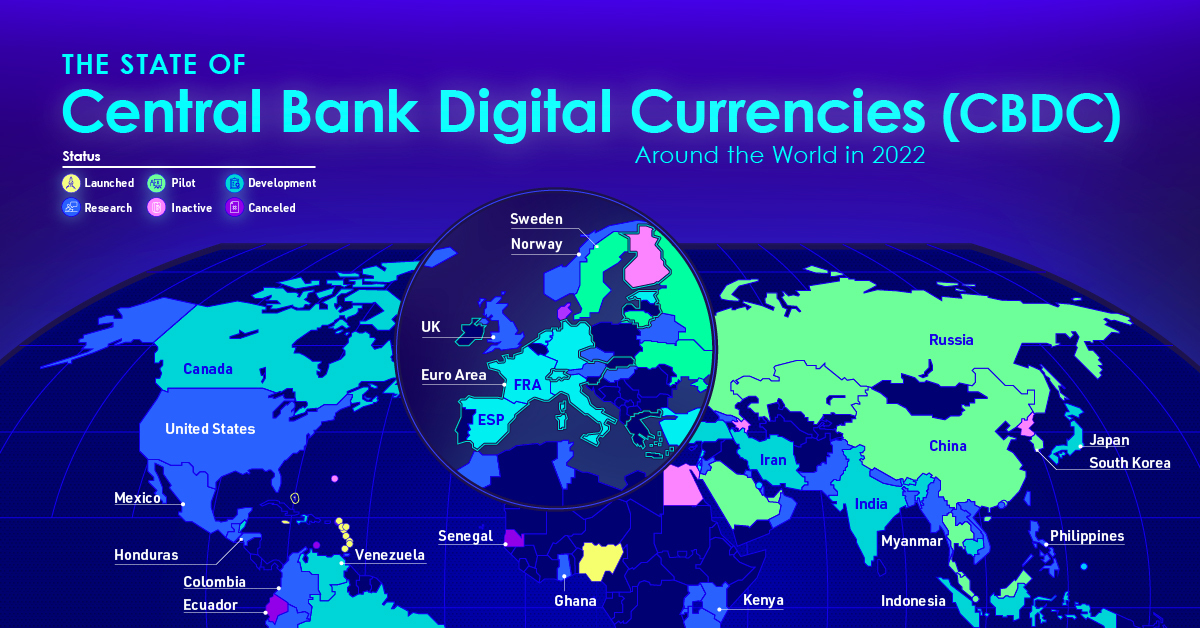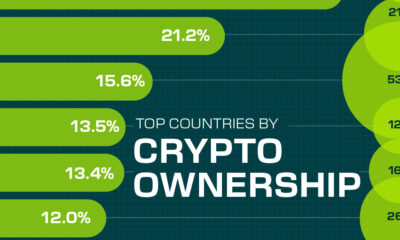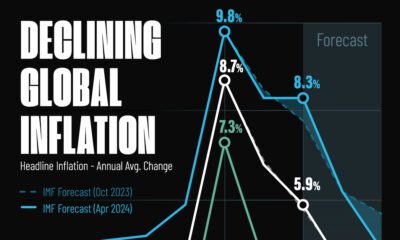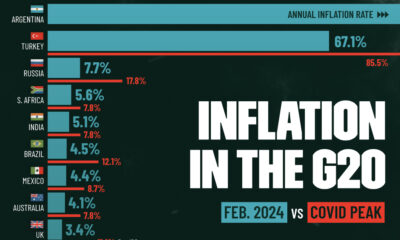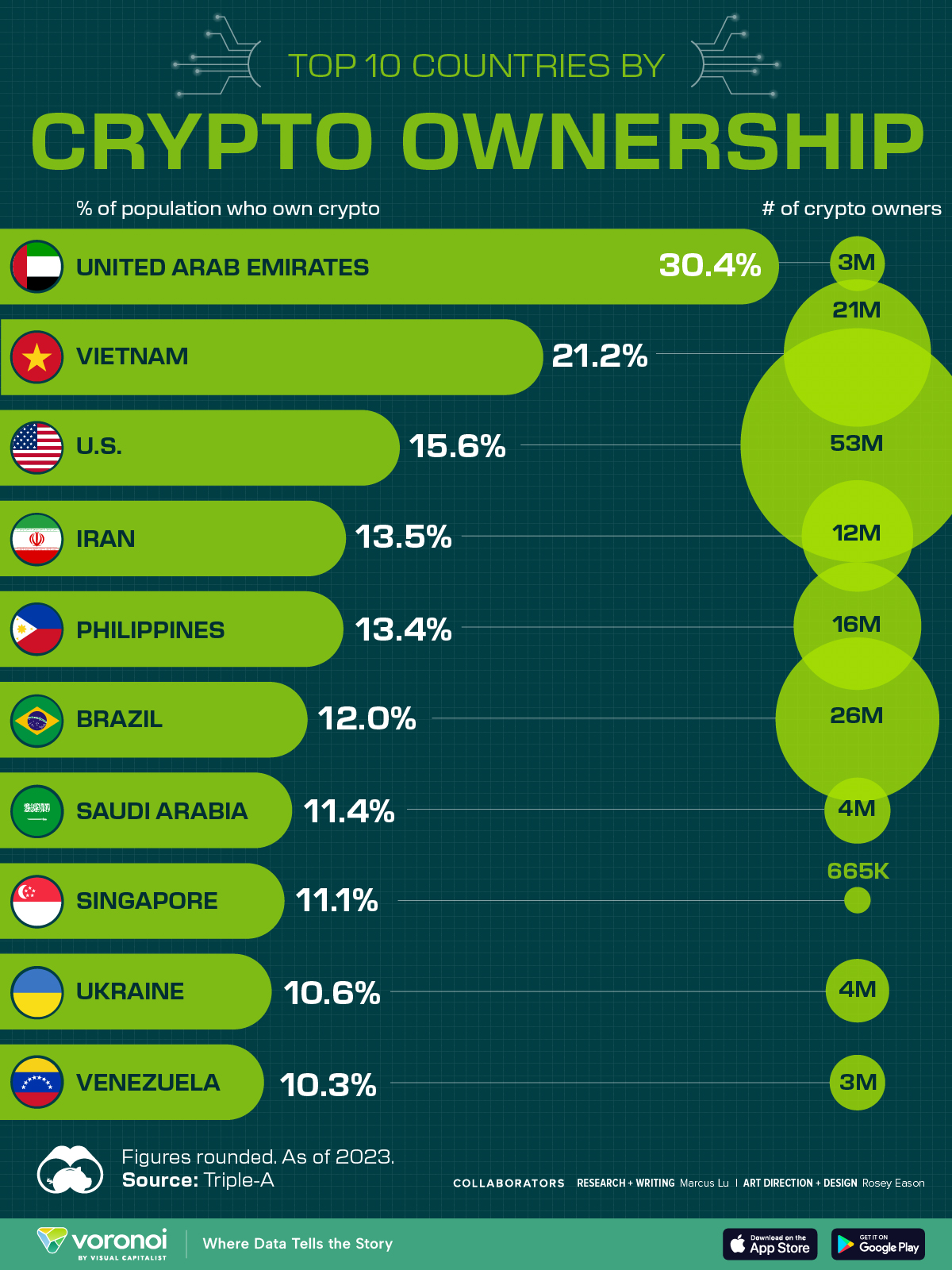Technology
Visualized: The State of Central Bank Digital Currencies
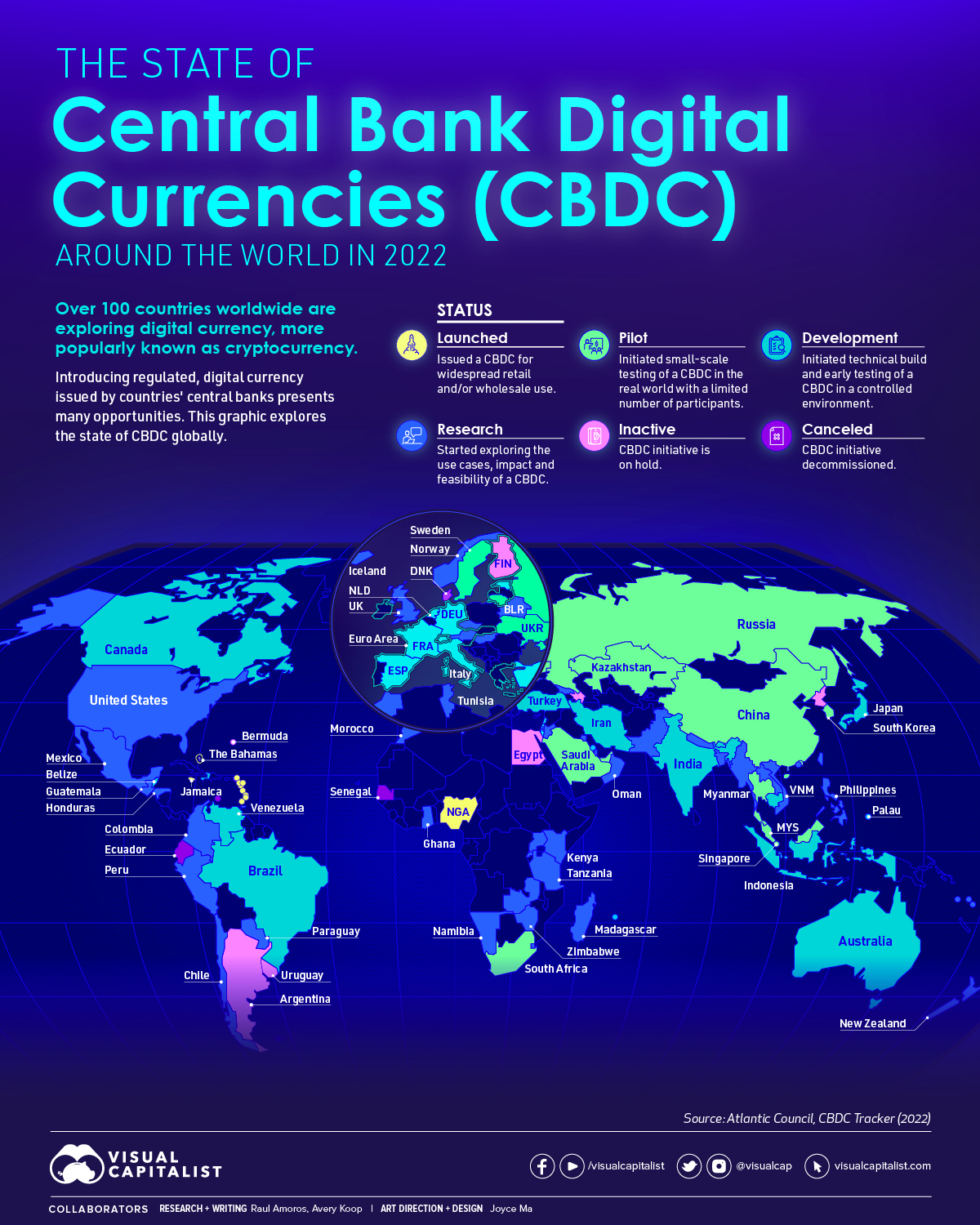
Visualized: The State of Central Bank Digital Currencies
Central banks around the world are getting involved in digital currencies, but some are further ahead than others.
In this map, we used data from the Atlantic Council’s Currency Tracker to visualize the state of each central banks’ digital currency effort.
Digital Currency – The Basics
Digital currencies have been around since the 1980s, but didn’t become widely popular until the launch of Bitcoin in 2009. Today, there are thousands of digital currencies in existence, also referred to as “cryptocurrencies”.
A defining feature of cryptocurrencies is that they are based on a blockchain ledger. Blockchains can be either decentralized or centralized, but the most known cryptocurrencies today (Bitcoin, Ethereum, etc.) tend to be decentralized in nature. This makes transfers and payments very difficult to trace because there is no single entity with full control.
Government-issued digital currencies, on the other hand, will be controlled by a central bank and are likely to be easily trackable. They would have the same value as the local cash currency, but instead issued digitally with no physical form.
Central Bank Digital Currencies Worldwide
105 countries are currently exploring centralized digital currencies. Together, they represent 95% of global GDP. The table below lists the data used in the infographic.
| Country | Status | Use Case |
|---|---|---|
| Nigeria | Launched | Retail |
| The Bahamas | Launched | Retail |
| Jamaica | Launched | Retail |
| Anguila | Launched | Retail |
| Saint Kitts and Nevis | Launched | Retail |
| Antigua and Barbuda | Launched | Retail |
| Montserrat | Launched | Retail |
| Dominica | Launched | Retail |
| Saint Lucia | Launched | Retail |
| Saint Vincent and the Grenadines | Launched | Retail |
| Grenada | Launched | Retail |
| Sweden | Pilot | Retail |
| Lithuania | Pilot | Retail |
| Ukraine | Pilot | Undecided |
| Kazakhstan | Pilot | Retail |
| Russia | Pilot | Retail |
| China | Pilot | Both |
| Thailand | Pilot | Both |
| Hong Kong | Pilot | Both |
| South Korea | Pilot | Retail |
| Saudi Arabia | Pilot | Wholesale |
| United Arab Emirates | Pilot | Wholesale |
| Singapore | Pilot | Wholesale |
| Malaysia | Pilot | Wholesale |
| South Africa | Pilot | Both |
| Canada | Development | Both |
| Belize | Development | Undecided |
| Haiti | Development | Both |
| Venezuela | Development | Both |
| Brazil | Development | Retail |
| Turkey | Development | Retail |
| Iran | Development | Retail |
| Bahrain | Development | Wholesale |
| India | Development | Both |
| Mauritius | Development | Both |
| Bhutan | Development | Both |
| Cambodia | Development | Retail |
| Indonesia | Development | Both |
| Palau | Development | Both |
| Australia | Development | Both |
| Japan | Development | Both |
| Spain | Development | Retail |
| France | Development | Both |
| Netherlands | Development | Retail |
| Switzerland | Development | Wholesale |
| Italy | Development | Undecided |
| Germany | Development | Undecided |
| Estonia | Development | Retail |
| Lebanon | Development | Retail |
| Israel | Development | Retail |
| Euro Area | Development | Both |
| United States | Research | Retail |
| Mexico | Research | Retail |
| Guatemala | Research | Undecided |
| Honduras | Research | Undecided |
| Trinidad andd Tobago | Research | Undecided |
| Colombia | Research | Undecided |
| Peru | Research | Undecided |
| Paraguay | Research | Undecided |
| Chile | Research | Retail |
| Iceland | Research | Retail |
| UK | Research | Both |
| Morocco | Research | Retail |
| Ghana | Research | Retail |
| Namibia | Research | Undecided |
| Eswatini | Research | Both |
| Madagastar | Research | Retail |
| Zimbabwe | Research | Undecided |
| Zambia | Research | Undecided |
| Tanzania | Research | Undecided |
| Rwanda | Research | Undecided |
| Uganda | Research | Undecided |
| Kenya | Research | Retail |
| Tunisia | Research | Wholesale |
| Oman | Research | Undecided |
| Kuwait | Research | Retail |
| Jordan | Research | Undecided |
| Georgia | Research | Retail |
| Belarus | Research | Undecided |
| Norway | Research | Retail |
| Czech Republich | Research | Undecided |
| Pakistan | Research | Retail |
| Nepal | Research | Undecided |
| Bangladesh | Research | Undecided |
| Myanmar | Research | Undecided |
| Laos | Research | Both |
| Vietnam | Research | Undecided |
| Macau | Research | Undecided |
| Taiwan | Research | Both |
| Philippines | Research | Retail |
| New Zealand | Research | Retail |
| Vanuatu | Research | Undecided |
| Fiji | Research | Undecided |
| Tonga | Research | Undecided |
| Palestine | Research | Retail |
| Jordan | Research | Undecided |
| Austria | Research | Wholesale |
| Hungary | Research | Retail |
| Bermuda | Inactive | Undecided |
| Sint Maarten | Inactive | Retail |
| Curaçao | Inactive | Retail |
| Argentina | Inactive | Undecided |
| Uruguay | Inactive | Retail |
| Denmark | Inactive | Retail |
| Azerbaijan | Inactive | Undecided |
| Egypt | Inactive | Undecided |
| North Korea | Inactive | Undecided |
| Finland | Inactive | Retail |
| Ecuador | Cancelled | Retail |
| Senegal | Cancelled | Retail |
When aggregated, we can see that the majority of countries are in the research stage.
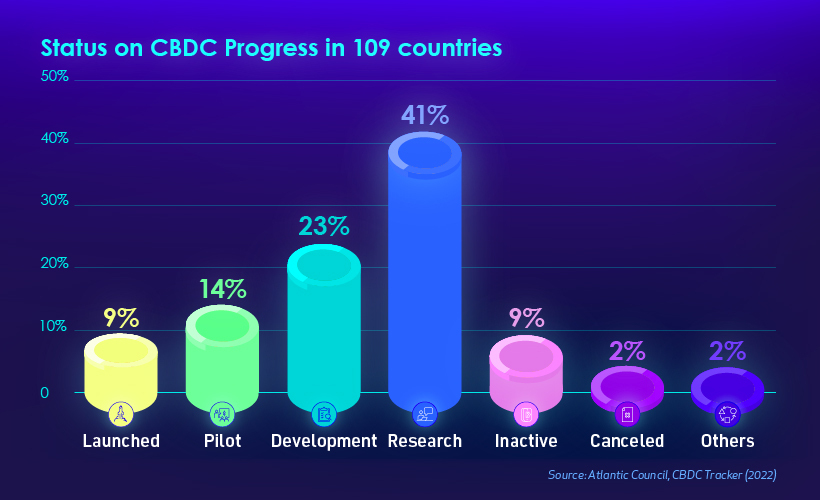
We’ve also divided the map by region to make viewing easier.
Africa
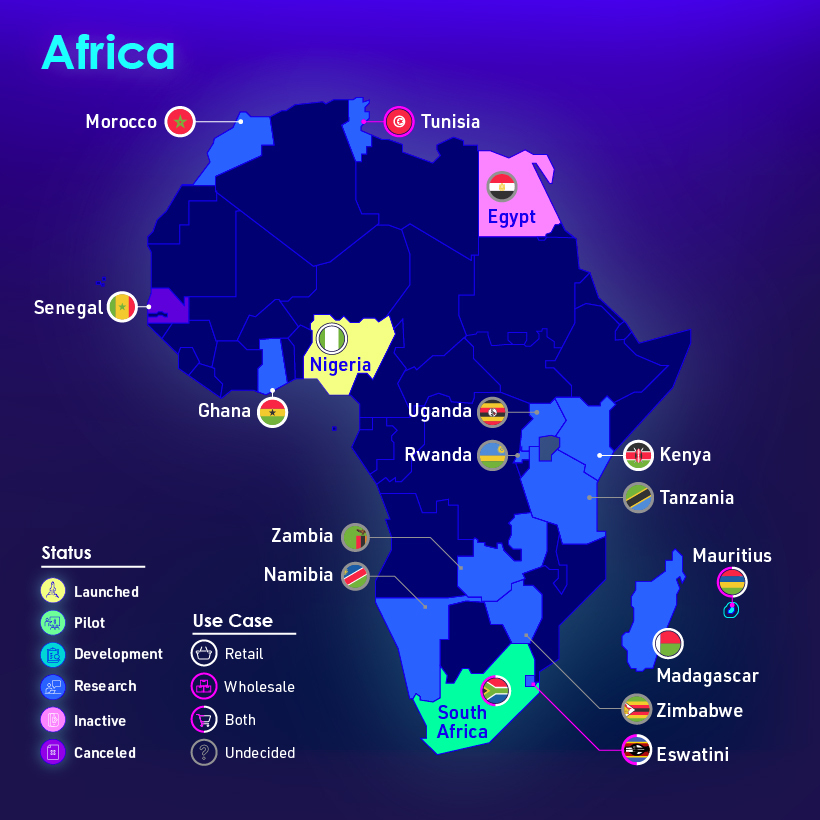
Asia
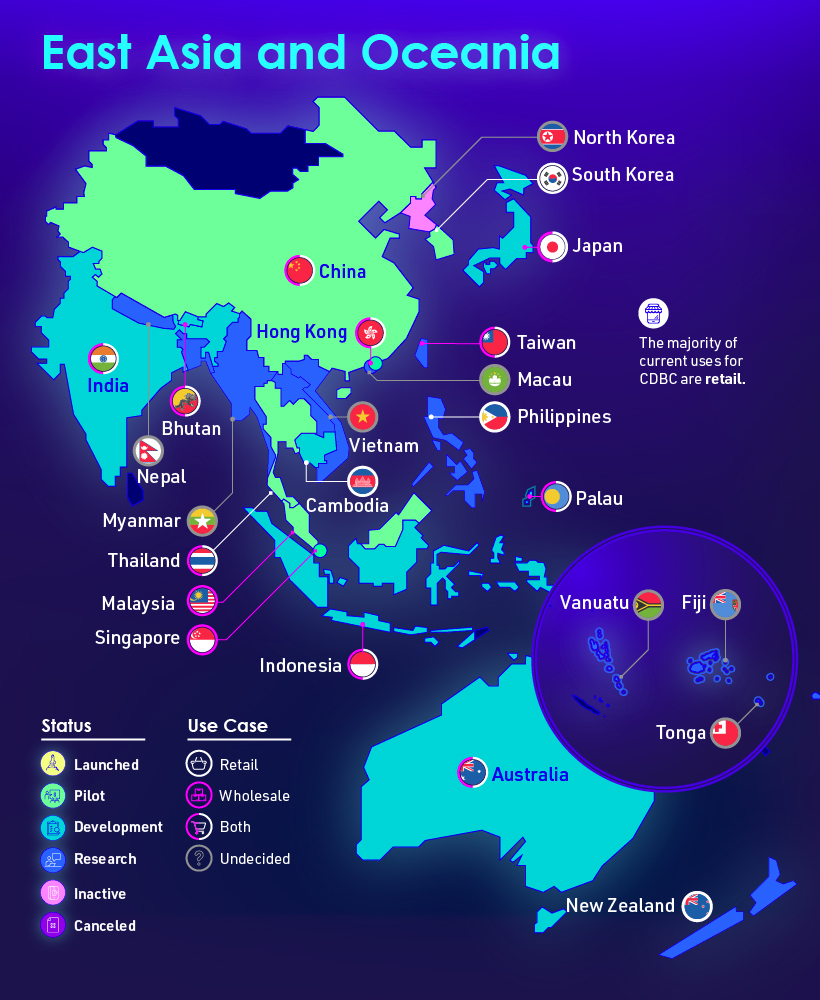
Europe
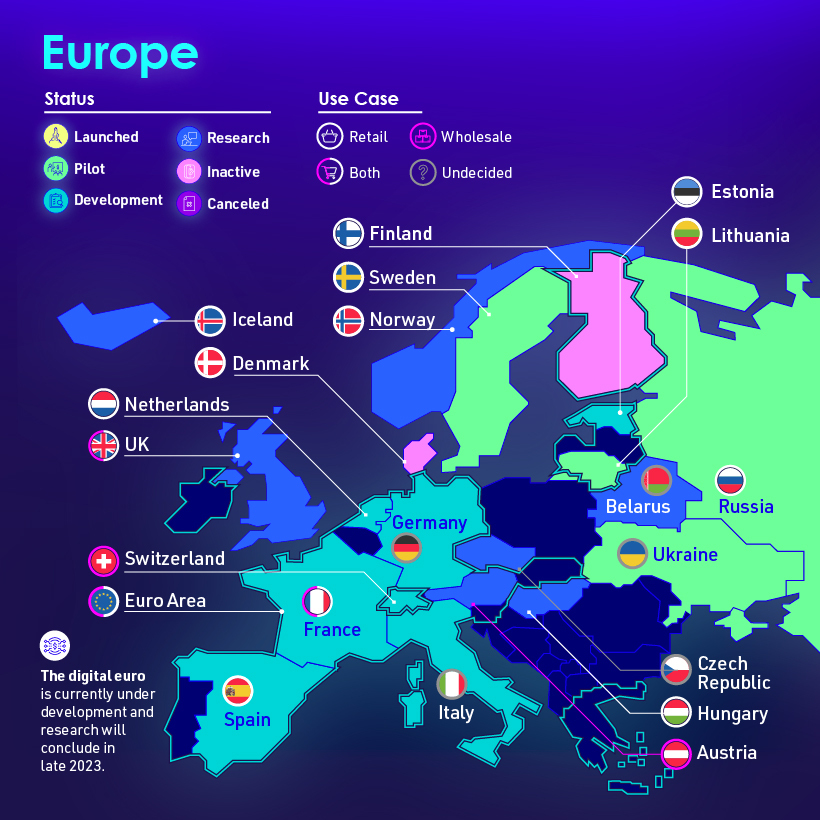
Middle East
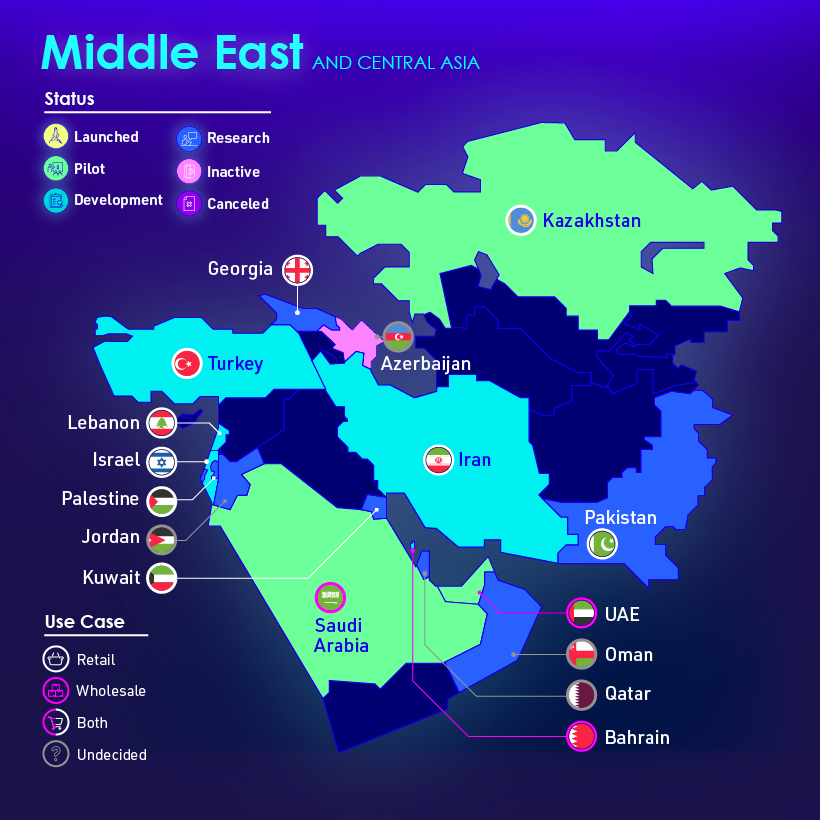
South America
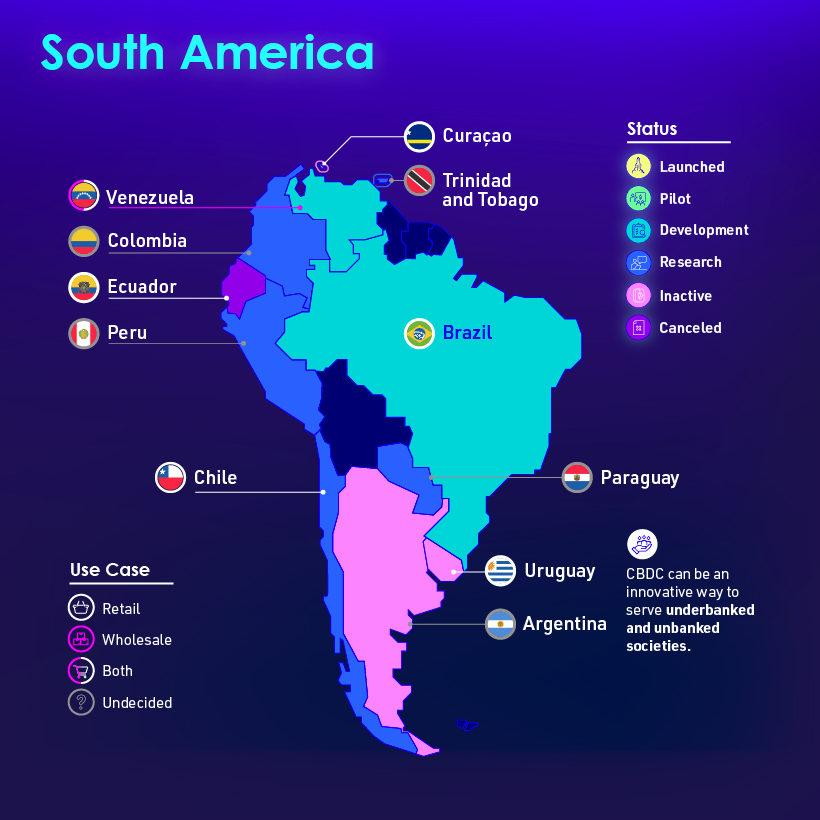
North America
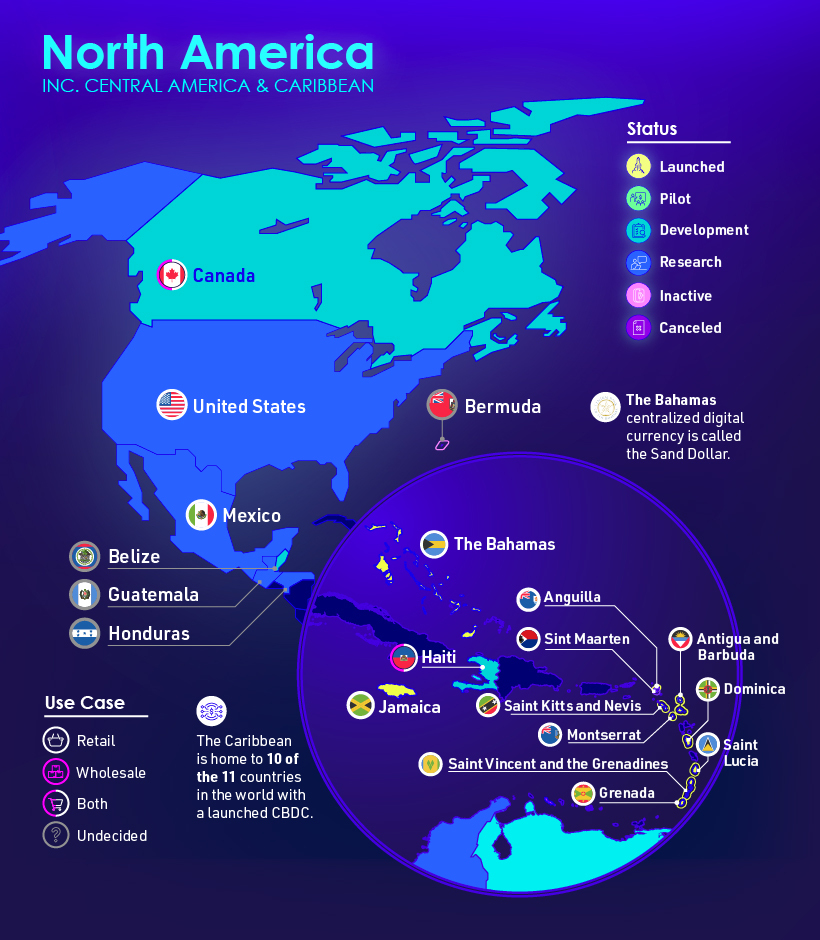
What are the Benefits?
A major benefit of government-issued digital currencies is that they can improve access for underbanked people.
This is not a huge issue in developed countries like the U.S., but many people in developing nations have no access to banks and other financial services (hence the term underbanked). As the number of internet users continues to climb, digital currencies represent a sound solution.
To learn more about this topic, visit this article from Global Finance, which lists the world’s most underbanked countries in 2021.
The 9%
Just 9% of countries have launched a digital currency to date.
This includes Nigeria, which became the first African country to do so in October 2021. Half of the country’s 200 million population is believed to have no access to bank accounts.
Adoption of the eNaira (the digital version of the naira) has so far been relatively sluggish. The eNaira app has accumulated 700,000 downloads as of April 2022. That’s equal to 0.35% of the population, though not all of the downloads are users in Nigeria.
Conversely, 33.4 million Nigerians were reported to be trading or owning crypto assets, despite the Central Bank of Nigeria’s attempts to restrict usage.
Status in the U.S.
America’s central bank, the Federal Reserve, has not decided on whether it will implement a central bank digital currency (CBDC).
Our key focus is on whether and how a CBDC could improve on an already safe and efficient U.S. domestic payments system.
– Federal Reserve
To learn more, check out the Federal Reserve’s January 2022 paper on the pros and cons of CBDCs.
Technology
Countries With the Highest Rates of Crypto Ownership
While the U.S. is a major market for cryptocurrencies, two countries surpass it in terms of their rates of crypto ownership.
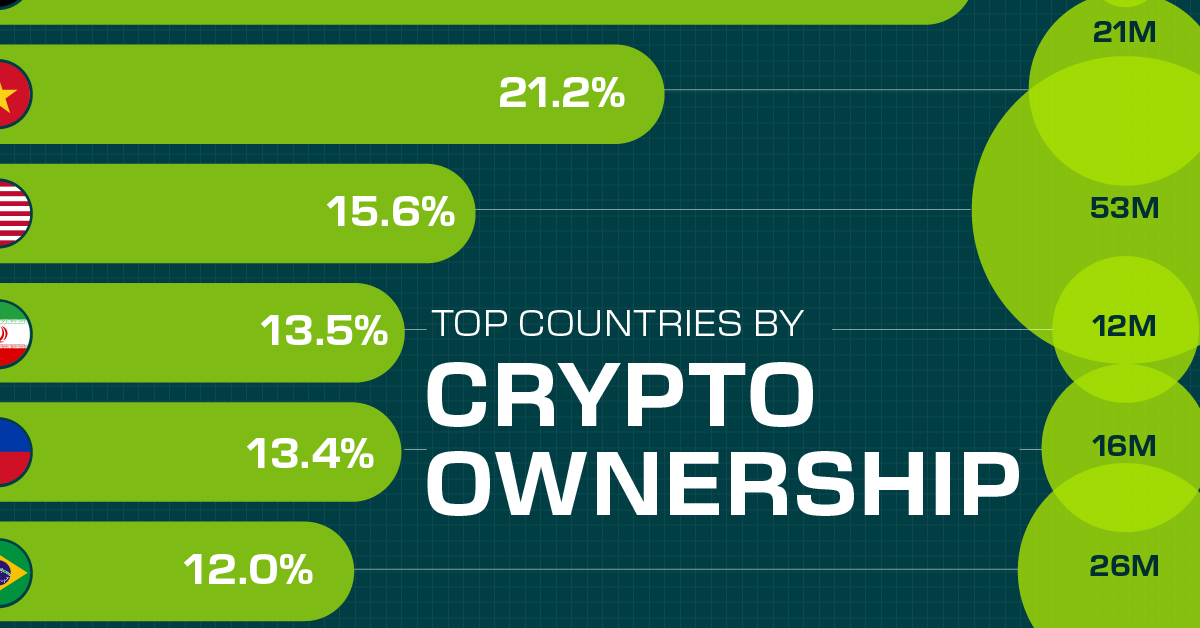
Countries With the Highest Rates of Crypto Ownership
This was originally posted on our Voronoi app. Download the app for free on iOS or Android and discover incredible data-driven charts from a variety of trusted sources.
This graphic ranks the top 10 countries by their rate of cryptocurrency ownership, which is the percentage of the population that owns crypto. These figures come from crypto payment gateway, Triple-A, and are as of 2023.
Data and Highlights
The table below lists the rates of crypto ownership in the top 10 countries, as well as the number of people this amounts to.
| Country | % of Population Who Own Crypto | # of Crypto Owners |
|---|---|---|
| 🇦🇪 United Arab Emirates | 30.4 | 3M |
| 🇻🇳 Vietnam | 21.2 | 21M |
| 🇺🇸 U.S. | 15.6 | 53M |
| 🇮🇷 Iran | 13.5 | 12M |
| 🇵🇭 Philippines | 13.4 | 16M |
| 🇧🇷 Brazil | 12 | 26M |
| 🇸🇦 Saudi Arabia | 11.4 | 4M |
| 🇸🇬 Singapore | 11.1 | 665K |
| 🇺🇦 Ukraine | 10.6 | 4M |
| 🇻🇪 Venezuela | 10.3 | 3M |
Note that if we were to rank countries based on their actual number of crypto owners, India would rank first at 93 million people, China would rank second at 59 million people, and the U.S. would rank third at 52 million people.
The UAE Takes the Top Spot
The United Arab Emirates (UAE) boasts the highest rates of crypto ownership globally. The country’s government is considered to be very crypto friendly, as described in Henley & Partners’ Crypto Wealth Report 2023:
In the UAE, the Financial Services Regulatory Authority (FSRA-ADGM) was the first to provide rules and regulations regarding cryptocurrency purchasing and selling. The Emirates are generally very open to new technologies and have proposed zero taxes for crypto owners and businesses.
Vietnam leads Southeast Asia
According to the Crypto Council for Innovation, cryptocurrency holdings in Vietnam are also untaxed, making them an attractive asset.
Another reason for Vietnam’s high rates of ownership could be its large unbanked population (people without access to financial services). Cryptocurrencies may provide an alternative means of accessing these services without relying on traditional banks.
Learn More About Crypto From Visual Capitalist
If you enjoyed this post, be sure to check out The World’s Largest Corporate Holders of Bitcoin, which ranks the top 12 publicly traded companies by their Bitcoin holdings.
-
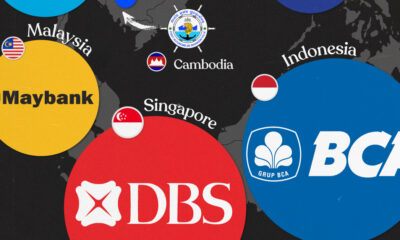
 Markets5 days ago
Markets5 days agoMapped: The Most Valuable Company in Each Southeast Asian Country
-
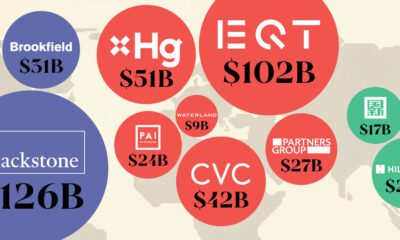
 Markets2 weeks ago
Markets2 weeks agoThe Top Private Equity Firms by Country
-
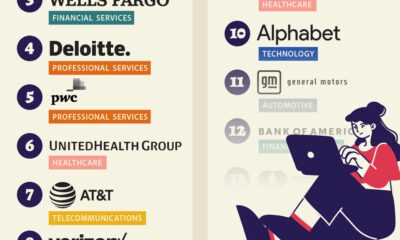
 Jobs2 weeks ago
Jobs2 weeks agoThe Best U.S. Companies to Work for According to LinkedIn
-
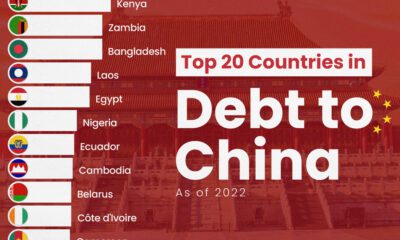
 Economy2 weeks ago
Economy2 weeks agoRanked: The Top 20 Countries in Debt to China
-
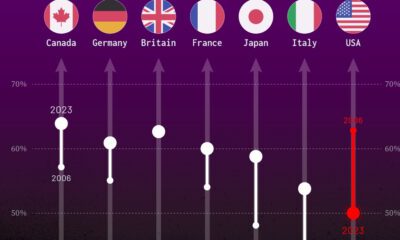
 Misc2 weeks ago
Misc2 weeks agoCharted: Trust in Government Institutions by G7 Countries
-
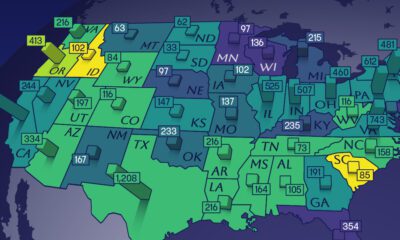
 Energy1 week ago
Energy1 week agoMapped: The Age of Energy Projects in Interconnection Queues, by State
-
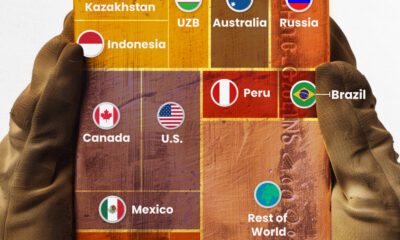
 Mining1 week ago
Mining1 week agoVisualizing Global Gold Production in 2023
-
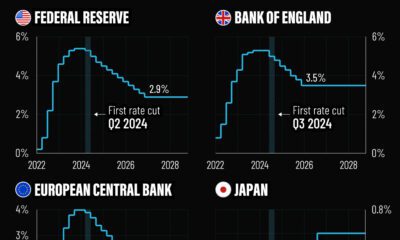
 Markets1 week ago
Markets1 week agoVisualized: Interest Rate Forecasts for Advanced Economies




